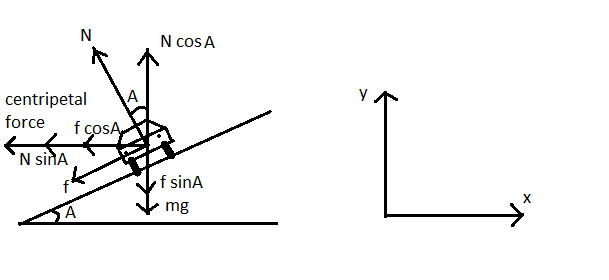
Derive an expression for maximum speed of a car on a banked road in circular motion.
Answer
554.3k+ views
Hint:In this question, we need to find the maximum speed of the car at which car doesn’t skid while moving in a circular banked road. We basically balance all the factors of the forces exerted on a car in x-axis direction and y-axis direction.
To solve any balancing problems, whether motion is translational or rotational, we always balance forces acting along x-axis and y-axis.
In case of rotational motion, we balance torques acting on the body.
Complete step-by-step answer:
Several formulas used in our calculations are-
Gravitational attraction force – mg
Frictional force (f) – acting between car’s tire and road, and parallel to the slope of road
Normal force (N)- It is a reaction force of the gravitational force exerted by the road on car
Centripetal force $\left( \dfrac{m{{v}^{2}}}{r} \right)$ - acting towards the center of the circular path followed by the car.

Let’s take inclination angle A of road with respect to the x-axis as shown in the above diagram. Now we can balance all the x-axis and y-axis factors of forces. Refer to the figure.
(1) Balancing all the forces acting along the x-axis-
$f\cos (A)+N\sin (A)=\dfrac{m{{v}^{2}}}{r}$
Substituting the value $f=\mu N$ into equation, we get
$\begin{align}
& \mu N\cos (A)+N\sin (A)=\dfrac{m{{v}^{2}}}{r} \\
& \Rightarrow N\left( \mu \cos A+\sin A \right)=\dfrac{m{{v}^{2}}}{r}......(1) \\
\end{align}$
(2) Balancing all the forces acting along the y-axis-
$\begin{align}
& N\cos A=f\sin A+mg \\
& \Rightarrow N\cos A=\mu N\sin A+mg \\
& \Rightarrow N\left( \cos A-\mu \sin A \right)=mg........(2) \\
\end{align}$
(3) Frictional force-
$f=\mu N$
Now we will use these three equations to find the value of speed (v).
Now we can divide equation (1) and (2), we get
\[\begin{align}
& \dfrac{{{v}^{2}}}{rg}=\dfrac{\left( \mu +\tan A \right)}{\left( 1-\mu \tan A \right)} \\
& \Rightarrow v=\sqrt{\dfrac{rg\left( \mu +\tan A \right)}{\left( 1-\mu \tan A \right)}} \\
\end{align}\]
This is an expression for maximum speed of a car on a banked road in circular motion.
Note: (1) Roads are banked to prevent high speed cars from skidding.
(2) If a car is moving at a speed more than mentioned above, it will skid.
(3) If the force of friction is not strong enough, the vehicle will skid. Also, note that friction acts downwards along the road, as the tendency of the car is to skid up.
To solve any balancing problems, whether motion is translational or rotational, we always balance forces acting along x-axis and y-axis.
In case of rotational motion, we balance torques acting on the body.
Complete step-by-step answer:
Several formulas used in our calculations are-
Gravitational attraction force – mg
Frictional force (f) – acting between car’s tire and road, and parallel to the slope of road
Normal force (N)- It is a reaction force of the gravitational force exerted by the road on car
Centripetal force $\left( \dfrac{m{{v}^{2}}}{r} \right)$ - acting towards the center of the circular path followed by the car.

Let’s take inclination angle A of road with respect to the x-axis as shown in the above diagram. Now we can balance all the x-axis and y-axis factors of forces. Refer to the figure.
(1) Balancing all the forces acting along the x-axis-
$f\cos (A)+N\sin (A)=\dfrac{m{{v}^{2}}}{r}$
Substituting the value $f=\mu N$ into equation, we get
$\begin{align}
& \mu N\cos (A)+N\sin (A)=\dfrac{m{{v}^{2}}}{r} \\
& \Rightarrow N\left( \mu \cos A+\sin A \right)=\dfrac{m{{v}^{2}}}{r}......(1) \\
\end{align}$
(2) Balancing all the forces acting along the y-axis-
$\begin{align}
& N\cos A=f\sin A+mg \\
& \Rightarrow N\cos A=\mu N\sin A+mg \\
& \Rightarrow N\left( \cos A-\mu \sin A \right)=mg........(2) \\
\end{align}$
(3) Frictional force-
$f=\mu N$
Now we will use these three equations to find the value of speed (v).
Now we can divide equation (1) and (2), we get
\[\begin{align}
& \dfrac{{{v}^{2}}}{rg}=\dfrac{\left( \mu +\tan A \right)}{\left( 1-\mu \tan A \right)} \\
& \Rightarrow v=\sqrt{\dfrac{rg\left( \mu +\tan A \right)}{\left( 1-\mu \tan A \right)}} \\
\end{align}\]
This is an expression for maximum speed of a car on a banked road in circular motion.
Note: (1) Roads are banked to prevent high speed cars from skidding.
(2) If a car is moving at a speed more than mentioned above, it will skid.
(3) If the force of friction is not strong enough, the vehicle will skid. Also, note that friction acts downwards along the road, as the tendency of the car is to skid up.
Recently Updated Pages
Dimensions of Charge: Dimensional Formula, Derivation, SI Units & Examples

How to Calculate Moment of Inertia: Step-by-Step Guide & Formulas

Circuit Switching vs Packet Switching: Key Differences Explained

Dimensions of Pressure in Physics: Formula, Derivation & SI Unit

JEE Extractive Metallurgy Important Concepts and Tips for Exam Preparation

JEE General Topics in Chemistry Important Concepts and Tips

Trending doubts
JEE Main 2026: Session 1 Results Out and Session 2 Registration Open, City Intimation Slip, Exam Dates, Syllabus & Eligibility

Ideal and Non-Ideal Solutions Explained for Class 12 Chemistry

JEE Main Participating Colleges 2026 - A Complete List of Top Colleges

Understanding the Angle of Deviation in a Prism

Understanding Electromagnetic Waves and Their Importance

Hybridisation in Chemistry – Concept, Types & Applications

Other Pages
JEE Advanced Marks vs Ranks 2025: Understanding Category-wise Qualifying Marks and Previous Year Cut-offs

JEE Advanced 2026 - Exam Date (Released), Syllabus, Registration, Eligibility, Preparation, and More

CBSE Notes Class 11 Physics Chapter 4 - Laws of Motion - 2025-26

CBSE Notes Class 11 Physics Chapter 14 - Waves - 2025-26

CBSE Notes Class 11 Physics Chapter 9 - Mechanical Properties of Fluids - 2025-26

CBSE Notes Class 11 Physics Chapter 11 - Thermodynamics - 2025-26




